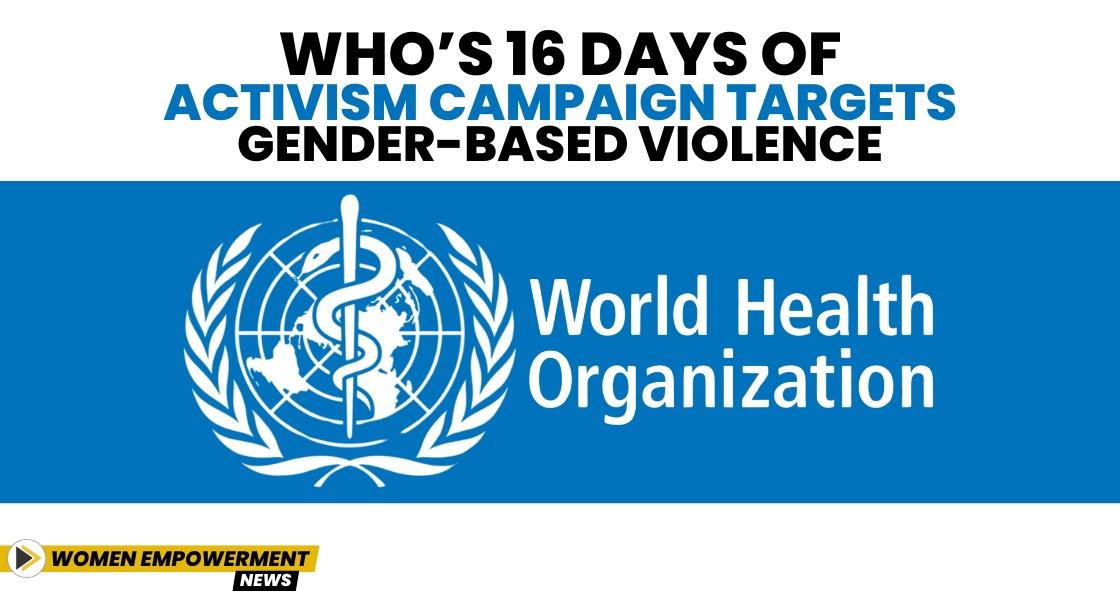WHO’s 16 Days of Activism Campaign Targets Gender-Based Violence

News Synopsis
The World Health Organization (WHO), under the leadership of its South-East Asia Regional Director Saima Wazed, has kicked off a 16 Days of Activism campaign aimed at eradicating gender-based violence (GBV). The campaign, which began on November 25—the International Day for the Elimination of Violence Against Women—will run until December 10, coinciding with International Human Rights Day.
This year’s initiative is especially significant, as it aligns with the forthcoming 30th anniversary of the Beijing Declaration and Platform for Action (BPOA), which will undergo a review at the Commission on the Status of Women in March 2025. Signed by 189 nations in 1995, the BPOA remains a cornerstone for global efforts in advancing gender equality and women's rights.
Progress and Challenges in Addressing GBV
WHO South-East Asia Regional Director Saima Wazed emphasized that the upcoming global review of the Beijing Declaration and Platform for Action (BPOA) presents a critical moment to assess advancements and challenges in eliminating violence against women and girls. She remarked:
“The 16 Days of Activism presents a crucial opportunity for individuals and organizations to amplify efforts to eradicate all forms of gender-based violence in various settings, including private, public, workplace, and online spaces.”
The WHO 16 Days of Activism aimed at eradicating gender-based violence (GBV) campaign focuses on women and girls living in humanitarian crises, who face elevated risks of GBV due to ongoing global conflicts and natural disasters. Refugee camps and conflict zones, where women often have limited mobility and access to essential services, are of particular concern.
Forms of GBV highlighted in the campaign include:
-
Intimate partner violence
-
Early marriages
-
Workplace harassment
-
Digital violence
The Impact of Gender-Based Violence
The consequences of GBV are devastating, with survivors often enduring severe physical and mental health repercussions, such as:
-
Injuries
-
Unintended pregnancies
-
Sexually transmitted infections (STIs)
-
Depression and PTSD
Limited access to healthcare exacerbates these issues, perpetuating cycles of disempowerment and hindering women's socio-economic progress.
Progress Made in Combating GBV
Although significant challenges persist, progress has been made in some countries. WHO highlights legal frameworks and support systems, including:
-
India's Protection of Women from Domestic Violence Act (2005)
-
Thailand's Domestic Violence Victim Protection Act (2007)
-
Indonesia's Sexual Violence Crime Law (2022)
Additionally, One-Stop Centres and helplines in countries like Bangladesh, Bhutan, India, Nepal, Maldives, Sri Lanka, and Thailand provide essential support to GBV survivors.
The Way Forward: A Collaborative Approach
To address the pervasive nature of GBV, Wazed proposed a “4P approach”, which includes:
-
Promoting investment in women and girls
-
Providing access to essential services
-
Protecting marginalized groups
-
Performing through data-driven, equitable healthcare systems
She added that WHO is leveraging tools like the RESPECT framework for GBV prevention and INNOV8 for health equity, alongside initiatives like Spotlight 2.0, to advance long-term solutions.
“As we approach the Beijing +30 Global Review, achieving progress requires a collaborative approach with targeted efforts for conflict and hazard-prone settings. Together, we can accelerate efforts to combat GBV, as healthy, safe, and empowered women and girls are the foundation of resilient societies today and in the future,” Wazed said.
Conclusion
The 16 Days of Activism campaign, launched by the WHO, underscores the urgent need to tackle gender-based violence through a united global effort. As the 30th anniversary of the Beijing Declaration and Platform for Action approaches, the campaign serves as a crucial platform for reflecting on progress and renewing commitments to eliminate violence against women and girls.
Despite advancements in legal frameworks and support services across various countries, the persistence of GBV highlights the need for systemic reforms, investment in women's empowerment, and strengthened protections for vulnerable populations.
The WHO’s “4P approach”—Promoting investment, Providing access to services, Protecting marginalized groups, and Performing through data-driven solutions—offers a clear pathway for progress. Collaboration between governments, civil society, and international organizations is key to accelerating these efforts.
As Saima Wazed emphasized, ensuring the safety, health, and empowerment of women and girls is not just a moral imperative but a foundation for building resilient societies. The campaign is a call to action for individuals, communities, and institutions worldwide to create lasting change and pave the way for a more equitable future.









